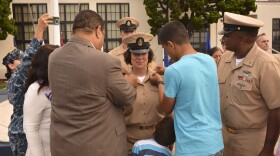The Department of Veterans Affairs is offering couples retreats to help former service members communicate with their spouses.
Inside a windowless hotel conference room in San Antonio, 27 couples seated themselves around tables, speaking nervously to one another.
They'd been booked for a free overnight hotel stay as part of Warrior To Soul Mate, a VA program that since 2012, has taught intimacy-building skills in group settings. While different from couples therapy, it's tailored to the needs of veterans and their spouses.
Some of the oldest attendees in San Antonio sported hats touting their era of war, such as Korea or Vietnam. The younger couples were quieter, thumbing through packets of information laid out before them or fixing their gazes on a projector screen at the front of the room.
They seemed to have little in common. But when a microphone got passed around the room, they shared similar stories of pain.
"I have PTSD, I have anger issues, I have trouble a lot of times controlling my emotions," said John Browning, a Marine Corps veteran from Alice, Tex. who saw combat in Vietnam.
He and his wife Barbara have been married more than 50 years and have survived a long list of surgeries and mental health setbacks.
"I hope to improve my communication skills with my wife," he continued, "and maybe to get more understanding of how to be a better husband."
Barbara Browning dabbed her face with tissue as she took the microphone.
"I've always been one to help others, and I feel for them when they have problems," she said. "He never told me what he went through in Vietnam until he went to pieces."
John previously received mental health counseling, Barbara said. But after he retired, his symptoms became more acute, making him hard to live with. Barbara, who has early-stage Alzheimer's Disease, said she doesn't know how they'll get by as a couple once it progresses.
"We just want to be close together always," she said, her voice tight. "But it is hard right now because he's agitated all the time and I don't know which way to do things."
Increased Focus On Family Services
Earlier this year, the VA announced plans to make more interventions available to veteran couples and families. As part of that, the VA is now training additional psychology staff, chaplains, social workers and other providers to perform couples counseling and lead programs like Warrior To Soul Mate.
The VA said Warrior To Soul Mate reaches about 1,200 to 1,400 people per year nationwide. In total, the VA saw more than 30,000 veterans for family and couples therapy in the government fiscal year that ended in September, an increase of more than 3,000 from the year before.

Veterans are more than 60% more likely to separate or divorce than non-veterans.
"There's an exceptionally high rate of divorce among active military and veterans due to the symptoms they've experienced during their service," said Faith Lane, a VA clinical social worker and Warrior To Soul Mate facilitator.
Post-traumatic stress, the strain of repeated deployments, injuries and medication issues can be challenging for military-affiliated couples. A veteran's spouse might become his or her caregiver, changing the dynamics of their relationship.
Lane said the behaviors that veterans learn in the military can make it harder for them to communicate with their partners later on. She said she often sees veterans shut down or explode because they've held their emotions in for long periods.
"One of the skills we're trying to teach is to broaden the range of emotion when communicating with a partner," Lane said.
Off Limits
For some couples, the disconnect is worse because the veteran is experiencing guilt and shame due to moral injuries sustained in service.
"Maybe it's something they did in their past that they're not proud of, something they're ashamed of," said Randy Holloway, a VA chaplain and Air Force reservist. "They're keeping that part closed off, and that spills into other parts of their life."
Abraham Cruz and his wife Maria of San Antonio said they came to Warrior To Soul Mate to start finding their way back to one another following Abraham's retirement from the Army.
But Abraham said there's one area that's off limits: his combat experiences.
"I decided not to bring whatever happened there to the house," he said. "I talk to other soldiers. They understand the complexities of making certain decisions in combat and what it means to take a human life. It changes you."
"There are boundaries," Maria added. "There's stuff I don't need to know, and I don't want to know because then I might look at him differently… and I don't want to look at him differently."
Maria and Abraham said they connected more during the retreat than they had in years.
"What she needs to know is that she's loved," Abraham said. "That [combat] didn't affect me to the point that she can't love me. Or that I can't love her."
This story was produced by the American Homefront Project, a public media collaboration that reports on American military life and veterans. Funding comes from the Corporation for Public Broadcasting.





